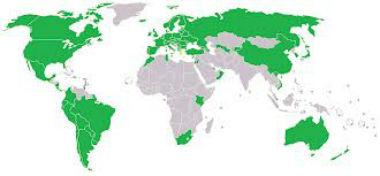By Florencia Ortúzar, legal advisor, AIDA
"Modern agriculture is not a system for producing food but for producing money"(Bill Mollison: Australian researcher, scientist, teacher, naturalist and the father of permaculture).
Seeds are the beginning of life itself. They are the means of nature’s propagation and the building blocks of life. Patenting seeds hands their ownership rights to a select few, and this causes great resentment among many. What does all of this really mean?
The UPOV: An international convention
The International Union for the Protection of New Varieties of Plants (UPOV) is an intergovernmental organization whose objective is to grant intellectual property rights to “breeders.” That is, to people who have created or discovered new varieties of seeds. Some countries in the Americas have signed the UPOV Convention, which was established in Paris in 1961 and revised three times (the latest in 1991), and others are considering it.
A seed needs to be considered a new variety in order to be patented. New varieties can be generated through the use of traditional techniques or genetic modification in laboratories. It is difficult to measure the possible ramifications of something so new and novel as the privatization of the life contained in a seed and, for good reason, many people are worried.
The situation in Chile (and other countries): To join or not to join?
Chile’s Congress is currently debating legislation known as the “Monsanto law” that, if passed, would implement the UPOV Convention and the ability to patent new seed varieties. This means that someone could alter the genetics of a native seed to become its inventor and owner. This would give them the right to sell it, charge a fee every time the seed is used, prohibit its trade in the market and draw up a contract dictating what farmers can and can’t do with the harvested product (for more information, you can listen to the interview (in Spanish) with the co-founder of the NGO Chile sin Transgénicos (Chile without Transgenics)). Proponents of the law argue that it is a necessary protection to encourage innovation in the country's agriculture sector.
Concerns
- Making native seeds obsolete: What chance does a native seed have for survival competing against a seed that is genetically modified to be more productive and efficient? According to market rules, the “new” cultivated seeds will displace the native ones. Even worse, GM crops could easily contaminate the remaining natural varieties.
- Monopolies: Those with the resources to create new seeds, especially genetically modified ones, which are the most profitable, are typically the huge corporations that today dominate the production of GM foods, like Monsanto. If the seed patent system were authorized in Chile, these companies would get a free pass to take control of the country’s cropland as they have already done with great efficacy in Argentina. What is more, the most profitable companies would gain access to the country’s most arable land, expanding monoculture practices while also forcing less profitable seeds out of the market even if they are more nutritional.

- Seed exchange: The “Monsanto law” grants great power to the seed owner by binding the seed purchaser to a contract that controls the entire harvest and the new seeds that are generated. Traditional practices such as the propagation, sale, gift giving and exchange of seeds, customs as old as agriculture itself, would be prohibited. The law would strip farmers not only of an essential part of their job but also a key source of income: the sale of cultivated seeds. As a consequence, the farmer would lose power and identity and become a mere cog in the corporate machine.
- Genetically modified crops: To the benefit of big companies, we inevitably favor the entry of genetically modified foods, the products with the greatest economic return. While the adverse side effects of eating GM food are not yet officially known, it seems wise to err on the side of the precautionary principle and avoid uncontrolled testing on humans. The advent of this law would protect GM crops. Natural products, which are less economical but generally more nutritional, would be overtaken by more productive seeds. There are many reasons to treat GM foods with caution. Rather than helping to end world hunger, we have increased the use of pesticides, destroyed biopersity, caused inequality between farmers and contaminated native varieties of seeds. It also is dangerous for people’s health to live near GM crops, as has been proven in Argentina.
- Environmental impacts: By allowing seed monopolization, crops will become homogenized to achieve the most economic harvests. This will lead to monocultures, many of them pesticide-resistant seeds that will require the use of alarming amounts of agrochemicals. Of particular concern, a lack of persity means crops become less resilient and adaptable to environmental changes, including those associated with global warming (You can read here (in Spanish) an article about the problems Argentina is experiencing with the expansion of GM soy monoculture).

- Unforeseeable risks: If a country drastically changes its agricultural system, the risks are difficult to predict. It is possible that a company could incite a plague that would force desperate farmers its new seed that is resistant to the plague. Another risk is that farmers could be unfairly penalized for using patented seeds, especially if farmers have not been properly educated about the new legislation. Could farmers face lawsuits, convictions and the burning and seizure of their crops?
Conclusion
The implementation of the UPOV Convention threatens to drastically change an essential part of the natural cycle. The most dangerous aspect is that the global initiative is attracting more followers. It does not seem fair that a person can pay a fee for a seed that should never really be the creation of a person. Although the “breeder” could have changed a gene, it should not give him the right to copyright and control the rest of the seed’s genetic information.
In Europe, only two countries have permitted the entry of GM crops. Chile has enormous potential to produce organic crops, and it could position itself successfully in the European market. But the Chilean authorities haven’t considered this as a possibility. The approval of the patent law on new seeds favors multinational seed monopolies, and this would allow the entry of GM crops that would displace and contaminate original varieties without the possibility of turning back. On the contrary, Peru recently passed a law banning the import and production of GM crops for 10 years. This is a good example to follow.



